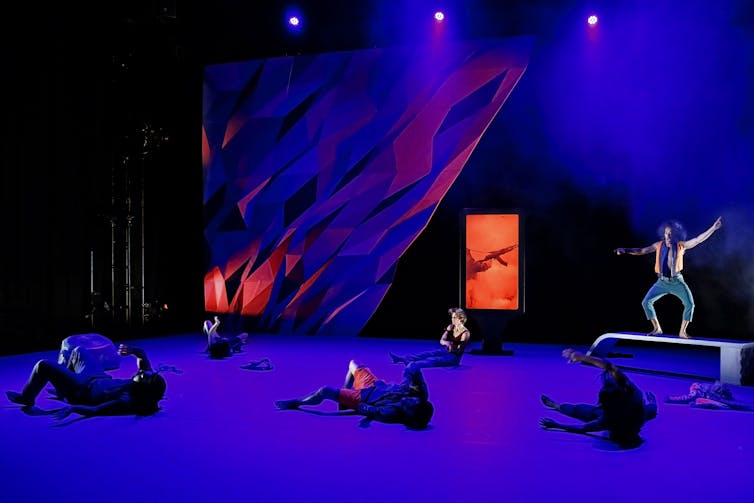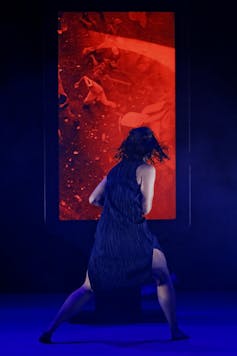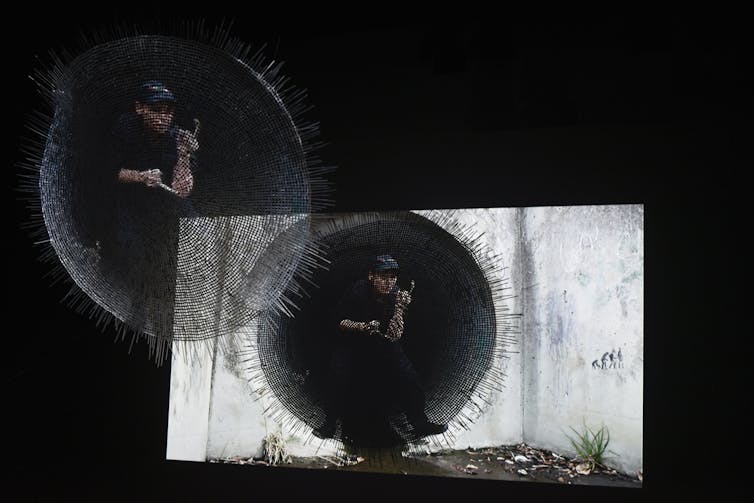First Nations dancers are stepping into the void left by Australia's politicians
- Written by Justine Shih Pearson, Honorary Associate, Department of Theatre and Performance Studies, University of Sydney
In the space of a few short weeks, I have seen two world premieres of dance theatre by First Nations artists: Le Dernier Appel (The Last Cry) and plenty serious TALK TALK. Both put front and centre the lived experience of Indigenous peoples at a time when they have been sidelined in Australian politics.
Australians are still waiting for a serious political conversation in response to last year’s momentous Uluru Statement from the Heart. This has been topped off, most recently, by the appointment of Tony Abbott as special envoy on Indigenous Affairs.
Read more: Turnbull government says no to Indigenous 'Voice to Parliament'
In this context, performance presents an opportunity to voice First Nations experiences and allow the broader public to engage in a conversation that might help to move the political debate along.
The first performance, Le Dernier Appel (The Last Cry), is collaboration between Broome-based intercultural dance theatre company Marrugeku and New Caledonian company Centre Culturel Tjibaou. The piece was inspired by the upcoming New Caledonian referendum on independence in November 2018 and the ongoing task of constitutional recognition for First Nations people in the Australia.
 Dancers in Le Dernier Appel.
Prudence Upton
Dancers in Le Dernier Appel.
Prudence Upton
The two situations are not identical. New Caledonia lives with the memory of a violent Kanak freedom movement in the 1980s; and as Senator Patrick Dodson pointed out in a talk during the season (he is patron and cultural consultant to Marrugeku), the Australian context is marked by a long “dragging out of the inevitable recognition” of our First Peoples, as the same debates are had century after century.
An unrelenting wave of shaking, stamping, falling, fighting, punching, and pulling, Le Dernier Appel paints a world full of emotion – of anger, of hurt and aggression. The opening scene sees the ensemble of six performers spread out across the stage. Facing the audience, feet planted, they seethe with energy barely contained.
Gradually, small ticks and quivers begin to show, before the inevitable explosion. Less didactic than Marrugeku’s previous ensemble works (such as Cut the Sky, Burning Daylight), this time “voice” is given over to the poetics of the moving body. The message is straightforward: there is immense physical endurance going on here.
 Le Dernier Appel.
Prudence Upton
Le Dernier Appel.
Prudence Upton
There are three Australian dancers: Dalisa Pigram, with strong, serpentine Yawuru-inspired movement, and long hair flailing; Bundjulung/Ngāpuhi woman Amrita Hepi whose gestural repertoire stutters and scratches like old-school rap; and Miranda Wheen whose quiet presence grows into all-in, risky abandon.
They are joined by New Caledonian b-boys Krylin Nguyen, who hits the floor in airflares that defy gravity to increase in speed and power as he goes; Stanley Nalo, phasing between muscular pops and liquid flight; and the hugely expressive Yoan Ouchot.
Once let loose, movement spills out of the dancers in ever-changing groupings, reorganising them but leaving them stuck with little hope of resolution.
The image that will stay with me is a section worked along the diagonal, all six dancers pushing and shoving and gesticulating wildly in repeated onslaught towards a bright light (the possible future? a deaf authority?), only to be pushed back to regroup and repeat again and again. Le Dernier Appel suffers from an unresolved ending, but really, what ending is possible?
The second work, plenty serious TALK TALK, is a solo by the independent choreographer Vicki Van Hout, presented by FORM Dance Projects. This is one brilliant show. In a series of impeccably performed monologues and dances, Wiradjuri woman Van Hout invites a complex conversation about Aboriginal sovereignty and land rights, identity and cultural ownership.
 Vicki Van Hout in plenty serious TALK TALK.
Heidrun Löhr.
Vicki Van Hout in plenty serious TALK TALK.
Heidrun Löhr.
With winning showmanship and cutting satire she sends up obligations to Welcome to Country and auctions off Indigenous dance steps. She invokes the persona “Ms Light Tan” who likes living on the edge and wonders what people would pay to buy her indigeneity (and its attendant “benefits”).
She worries about whether she is appropriating Aboriginal and Torres Strait dances (as well as technique from Martha Graham). In the darker second half, she recalls a frightening trip to hospital and re-enacts a brutal police bashing.
I am left dazzled by the virtuosity of Van Hout’s performance, her unmatched skill as a dancer and the biting creativity of her writing. But the show prompts us to be more than just dazzled — it asks us to go to some very uncomfortable places despite its light touch, and to consider the difficult cultural work that is required by our First Nations people. Van Hout stops and starts, changes tack, ties herself in knots, hits the ground hard from an unseen punch and rights herself again.
Our politicians, like many of us, may have the privilege to turn away from the work of truth-telling and treaty, leaving it for yet another generation. But this is not an option for First Nations people who bear the brunt of colonisation’s effects.
We may wish for theatre to give us the sense of reconciliation that eludes us in real life. But these two performances don’t offer an easy balm or cure-all: “the message is that we can talk,” the New Caledonian Centre Culturel Tjibaou director Emmanuel Tjibaou said in an interview while in Australia, “if it is a trauma to be colonised, then let’s talk about it and face it together.”
Le Dernier Appel (The Last Cry) was staged at CarriageWorks, Sydney, from August 18-20. It will be touring New Caledonia, Europe and Australia. plenty serious TALK TALK was staged at Parramatta Riverside from August 30.
Authors: Justine Shih Pearson, Honorary Associate, Department of Theatre and Performance Studies, University of Sydney





